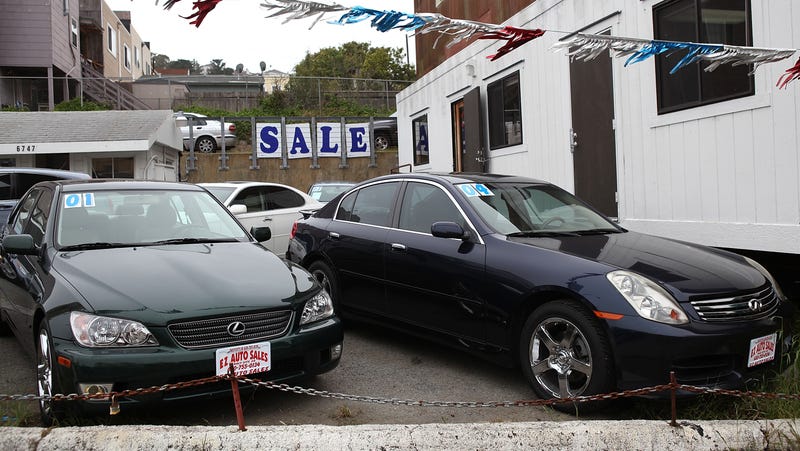
Buying a used car can be a bit more stressful than purchasing a new one. While it is possible to get a quality pre-owned vehicle, it requires a bit of patience and vigilance. However, you will want to be aware that there are some outdated but still prevalent strategies out there that may not give you the results you want.
Recently, we’ve seen a number of used car buying tips circulating from fairly respectable outlets like CNBC and Yahoo Finance, informing buyers on how to get the most for their money on a pre-owned car. While I strongly agree with some of the points, like understanding your budget and getting pre-approved for financing, once they start getting into the details of the shopping some of them miss they mark a bit.
Here are what I consider the top three errors that a lot of used car buyers make.
Don’t Rely On The CarFax
CarFax and other vehicle history report services like Autocheck can provide valuable information such as maintenance history or whether or not the car has been in a wreck. These data points can be good filters as to whether or not you want to pursue a car further.
However, these reports have shown to present inaccuracies or incomplete information. Sometimes accidents don’t get reported and therefore don’t appear on the report, and often it will seem like cars had more owners due to it being sold from one dealer group to another.
For the most part, this is common knowledge, but then you read something like this via CNBC:
You should also ask for the vehicle identification number (VIN), says Ricart. It’s a 17-digit number that’s assigned to every vehicle in the U.S. and allows you to pull a Carfax vehicle history report.
The report will cost about $40, but “is worth paying for,” he says. It provides key information about the car, including service and repair information, vehicle registration and reported accidents.”
While these reports do reveal some solid info you should not have to jump through hoops to get it—nor do I suggest paying for it. If you are researching multiple cars there is no reason to shell out $40 per report when the vast majority of dealers have these reports linked to their ad. And if a dealer doesn’t link a history report on their ad, that can sometimes be a red flag, so buyers should always request a copy from the dealer.
Don’t Trust The Dealer’s Inspection Process
There are a number of dealers that do their best to make sure they are selling a quality used car. Then there are other stores just looking for a quick buck. Both dealers will tell you that they have fully inspected and reconditioned the car prior to selling it, so who is telling the truth?
There is only one way to find out, and it’s not popping your head into the service area as CNBC’s expert says:
“If the dealer or seller claims they have inspected the vehicle, ask them where they do that… It’s good to actually see where the technicians are working on the car.”
I’m sorry to say most people probably won’t know what they’re looking at when they go into a service bay.
The best course of action is to have the car independently inspected by someone other than the dealership. Even if a car is a “certified pre-owned” model that supposedly meets a certain reconditioning standard, these inspections can be crucial. Technicians can miss things and some dealers play a little fast and loose with the certification process.
I was working with California client who wanted a BMW wagon, and I located a CPO example with low miles in Pennsylvania. Despite the fact that the car seemed pretty legit on paper, we used a local shop to inspect the car. The owner of the shop found that the car had a brake issue when slowing down from higher speeds. After some back and forth with the dealer, they agreed to replace the brake components prior to the sale.
Of course some dealers are going to put up some resistance on having their car sent out for an inspection, but usually, this is an indication that the dealer doesn’t want to be bothered with the effort and it doesn’t automatically mean the car is problematic. If that happens, there are a number of remote services than can send people to the dealership to provide an inspection and a report.
Don’t Negotiate In Person
I’m still amazed that in 2019 there are people that still insist that you negotiate a car deal like it’s 1999. Your time is valuable, and doing the marathon of back and forth with a dealer on a car deal only to maybe get to your goal is not a good use of your energy.
When it comes to negotiating a used car deal, Yahoo Finance cites a James Goodow , President & Managing Partner at Fennemore Craig, P.C.
According to Goodnow, you should make the first move. “In general, it’s best for you to anchor the parameters of the negotiation by making the first offer,” Goodnow said. “Dealers will generally not want to bid against their own prices, so don’t be afraid to put in an offer at or below the dealer invoice price.”
He also said buyers should be prepared for some back-and-forth before the car dealer reaches his final offer. “It’s nice to think that a dealer will cut to the chase,” Goodnow said. “But the reality is most won’t. It’s too ingrained in the car-buying culture.”
Goodow is an attorney, not a car salesperson or a car buying expert. How you negotiate a legal dispute is a bit different than coming to a price on a car. First of all, there is no “dealer invoice price” on a used car. The invoice is what a dealer will pay the manufacturer on a new car. Some dealers may have acquired that pre-owned car cheap via auction or maybe even “overpaid” a bit for someone’s trade to sweeten the deal for a new purchase. In either case it doesn’t really matter what the dealer paid for it. What matters most is what comparable vehicles are selling for.
Making a low-ball offer on a used car is going to set you up for a world of frustration because I have said it time and again that the margins on pre-owned are tighter today than most people realize. If the dealer thinks you are too far apart, they will often dig their heels in and not even counter-offer. However, if you can find a similar car for sale for a lower price that can be a leverage point.
But the negotiation should not have to happen in person. Use a combination of emails and phone calls to get where you want to be on the price and always get an itemized out the door in writing before you arrive because some dealers are a bit notorious for adding in a bunch of garbage fees. This method allows you to engage in multiple negotiations at once and you can easily kill a conversation with a store that is uncooperative.
All this work can be time-consuming and stressful, which is why outfits like CarMax, Carvana, and Vroom have grown in popularity because they claim to take some of the stress out of it. However, by choosing those avenues, customers might be trading convenience for value, and there is no guarantee that the inventory on their lots is substantially better than anywhere else.
[“source=jalopnik”]







